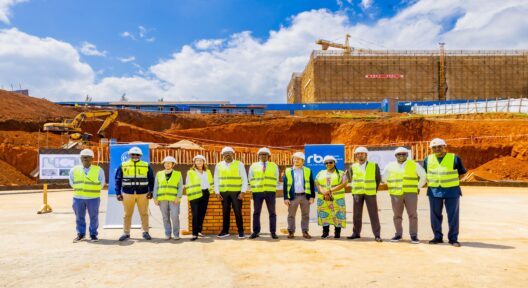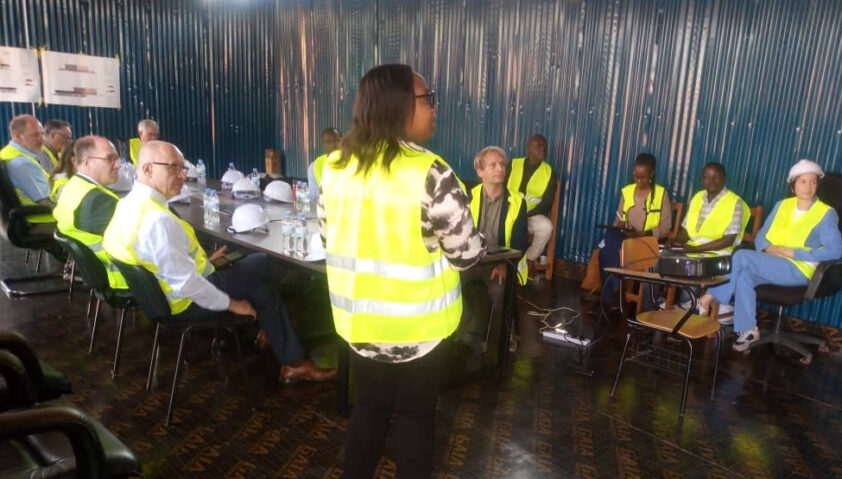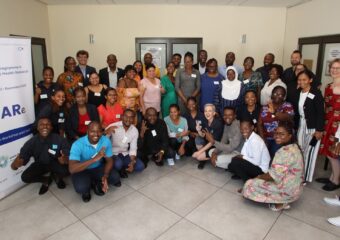EFFO-CoE to Improve the Clinical Management of High Consequence Infectious Diseases in Rwanda
Foundation stone laid and training launched: The project EFFO-CoE is building Rwanda’s first high-level isolation unit to improve care for patients with high consequence infectious diseases like Ebola virus disease.

The project ‘Efficiency by Edification – Center of Excellence’ (EFFO-CoE) aims to enhance Rwanda’s capabilities to manage high consequence infectious diseases (HCID) such as Ebola virus disease and Lassa fever. Rwanda’s first high-level isolation unit (HLIU) is under construction and a training programme is being established for Rwandan health care staff accordingly.
March 2024 saw the achievement of important project milestones.
Foundation stone laid for Rwanda’s high-level isolation unit in Kigali
On 12 March 2024 the foundation stone was officially laid for the high-level isolation unit in Rwanda’s capital, Kigali. Rwandan Health Minister Dr Sabin Nsanzimana and German Ambassador Heike Dettmann attended the ceremony. In his speech, Dr Nsanzimana emphasised the importance of the future HLIU in providing medical care for HCID patients. The construction work began in December 2023. Once completed, the HLIU will have ten beds and provide the best possible clinical care for HCID patients. The unit is the first of its kind in East Africa. In times when it’s not needed for HCID patients it can be used as an intensive care unit. As part of Kigali Health City, it will also act as a regional centre of excellence in the fields of patient care and training.
Training launched for Rwandan health service staff
Parallel to laying the foundation stone, the first one-week training course for future HLIU staff was held in the town of Nyamata, south of the capital, Kigali.
A total of 20 people were trained as a team to provide clinical care for HCID patients in the future HLIU. Their training covered aspects of infectious diseases, infection prevention and control, and intensive care medicine. Practical elements, such as providing patients with critical care while using personal protective equipment (PPE) were addressed extensively. Both the warm atmosphere and the enthusiasm of participants were a further boon for the course.
Building on the initial course, participants will be further attending a several months long online training, using webinars. They will then come together in person again for a final training unit in November 2024. To put training for HLIU staff on a sustainable footing, it is to be offered as an accredited short course at the University of Rwanda in future. This is to prepare hospital staff to provide clinical care for HCID patients.

Subcommittee of the German Bundestag visits Rwanda
February 2024 saw another highlight for EFFO-CoE. A delegation from the German Bundestag’s Subcommittee on Global Health visited Rwanda. The intent was to learn more about medical care and aspects of joint development cooperation. The fact-finding trip included a visit to the HLIU construction site. After a presentation of the project by the Rwanda Biomedical Centre (RBC) and the Robert Koch Institute (RKI), the delegation was given a guided tour of the construction site.
Since 2021, EFFO-CoE has received support under the Global Health Protection Programme (GHPP). The project is implemented by Unit 7.1 of the RKI’s Centre for Biological Threats and Special Pathogens (Zentrum für Biologische Gefahren und Spezielle Pathogene; ZBS). The RBC, Technische Universität Braunschweig, Charité – Universitätsmedizin Berlin and medmissio – Institute for Global Health, Würzburg are project partners.
Find out more about EFFO-CoE at www.effo.rki.de.



